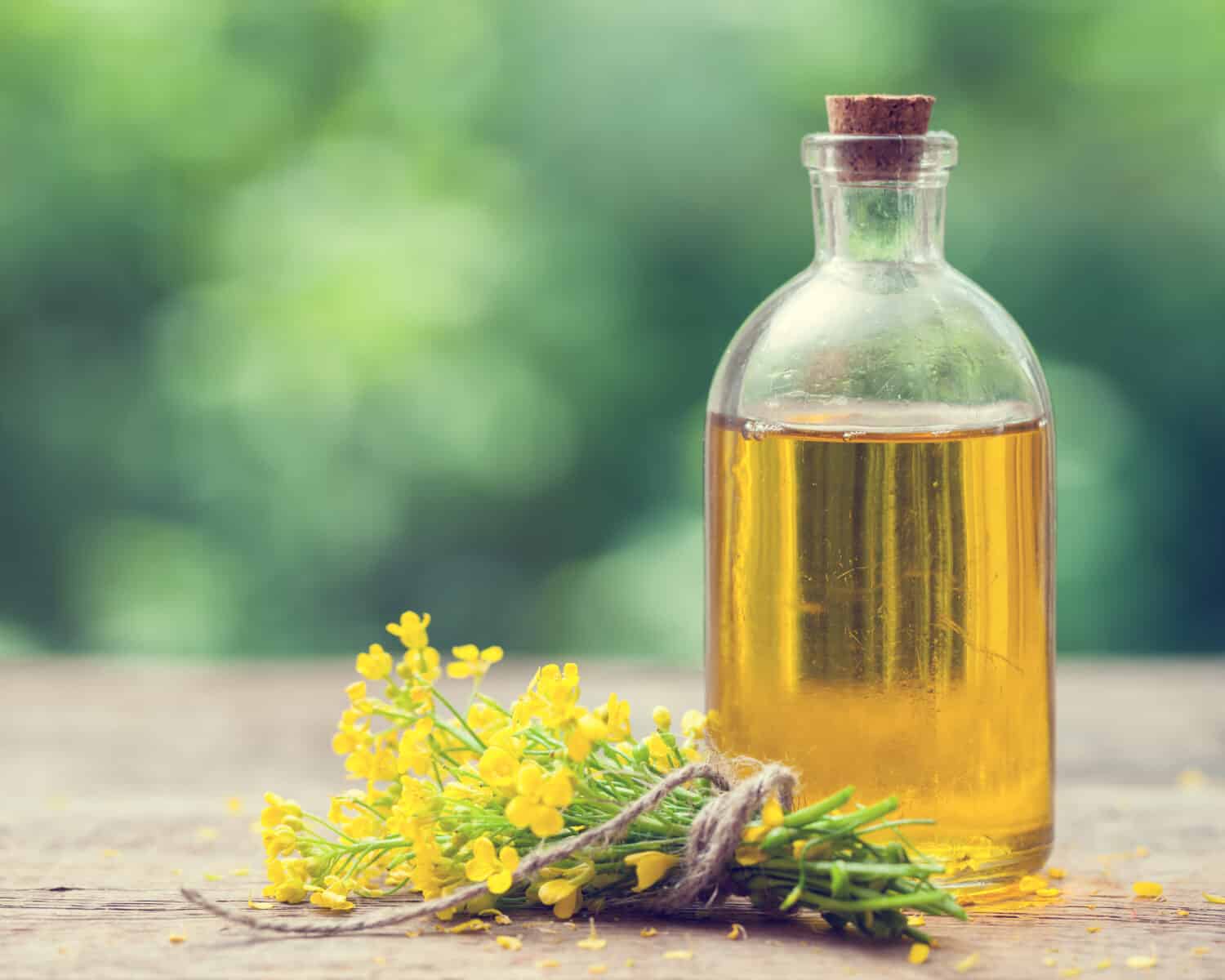Cooking oil can be beneficial to add to numerous dishes for stir-fry, baking, and even salad dressings. Whether using olive, peanut, corn, coconut, or canola oil, there is a plethora of uses and health benefits in using these fats. There are also downfalls of each one. Regarding popularity, canola oil is at the top of the list. However, the chatter lately has involved questions on whether or not canola oil is healthy for you, and rightfully so! With the variety of oils available, it sometimes isn't clear which ones are the best for our overall health.
We will get straight to the facts in this article: is canola oil healthy, and if not, what are the downfalls to adding this oil to our diets?
What is Canola Oil?
Canola oil comes from a hybrid crop from Canada. The crop that canola was crossbred from is the rapeseed plant. Additionally, there are several varieties of canola plants.
Canola plants are GMO. This fact has called into question the health benefits of canola oil. Canola oil also undergoes extensive processing, including conditioning, pressing, and desolventizing.
Canola oil is popular worldwide, and the United States is one of the top buyers from Canada. There is an extensive process for making canola oil. First, the canola seeds undergo crushing and then put into a solvent. From there, they are heated. They can also undergo a pressing method. The canola oil then goes through the refining process with water precipitation and organic acid. During this process, the vitamins, chlorophyll, and carotenoids decrease.
See below the potential health benefits and downfalls of adding canola oil to your diet.

Canola oil is one of the more popular cooking oils on the market. It is a hybrid plant that comes from rapeseed. It is low in saturated fat but also comes with a few downsides.
©Heike Rau/Shutterstock.com
Health Benefits Canola Oil
One of the questions asked before adding a food to a diet is, “Are there any vitamins and nutrients involved?”
Regarding canola oil, it contains two vitamins: Vitamin E and Vitamin K. There is 16% of the daily value of Vitamin E and 8% of the daily value of Vitamin K. However, during the processing, the vitamins are reduced.
There are also low amounts of saturated fat in canola oil but more polyunsaturated fat, which is a good fat that can benefit overall health.
One reason polyunsaturated fat has the label of being a good fat is the possible ability to lower LDL, triglycerides, and blood pressure.
Polyunsaturated fats have omega-6 fatty acids and alpha-linolenic acid, known as ALA. ALA is an omega-3 fatty acid.
Those looking to lower their LDL and blood pressure will add oils to their diet to increase their omega-3 and omega-6 fatty acids. Lowering these specific touch points may decrease the risk of heart problems.
Regarding vitamins and minerals, canola oil contains only vitamins K and E. Therefore, the most common reason people add this fat to their diet is the low saturated fat and higher levels of polyunsaturated fats.
Some studies have shown that consuming canola oil may positively affect women with PCOS by enhancing their insulin sensitivity. Additionally, it may also protect against certain cancers.
Downfalls of Canola Oil
Although canola oil is low in saturated fat, there are a few downfalls to be aware of.
For starters, canola oil is GMO or genetically modified. GMO foods are modified explicitly to make plants resistant to pests and herbicides. Although there needs to be more long-term studies to take a look at the downfall of consuming GMO foods, it has become a controversial topic, calling into question the safety of GMOs in the long term.
Some of these concerns are risks for cancer, allergies, and the fact that an increase of roundup, or herbicides, are being used around these crops. While more research and studies should be conducted, herbicides have been linked to animal studies that may show a correlation between different diseases and glyphosate. Therefore, many have opted to stay clear of GMO products.
Canola oil is also a refined oil. Refined oil undergoes bleaching and deodorizing. In short, this processing is a chemical treatment, stripping the plants of their nutrients. So, although canola oil contains some nutrients, the benefits are not as high once refined.
While not many long-term studies have been conducted on the health benefits of canola oil, organic and pressed oils are readily available for those who want to avoid GMO or highly processed oils.
Additionally, canola oil may also increase inflammation and blood pressure.

Canola oil is a GMO food. Therefore, those choosing to stay away from genetically modified food may want to choose a different cooking oil.
©Piece of Cake/Shutterstock.com
Healthy Choices to Substitute For Canola Oil
While canola oil is one of the more popular cooking oils and does contain a few health benefits, such as good fats, some may not be too keen on the downsides of consuming this fat. If canola oil is not the best option for one's diet, there are healthier alternatives. These include avocado oil, olive oil, and sunflower oil.
Olive oil is one of the more popular cooking oils. This is because it positively impacts heart health, including HDL and lowering LDL. The best option is extra virgin olive oil because it contains additional antioxidants.
Avocado oil is also an excellent alternative to canola oil. It may improve heart health and has lutein, which is very good for your eyes!
Sesame oil contains plenty of antioxidants and may improve blood sugar, which benefits people with type 2 diabetes.
Key Takeaways
- Canola oil contains only two vitamins.
- ALA and omega-3 fatty acids are very beneficial for those who are watching their heart health. This is because it can lower bad cholesterol and improve blood pressure.
- Canola crops are GMO plants. GMO crops are modified to withstand the elements of pests and treatment with a herbicide. Therefore, organic and pressed options are available if GMO foods are a concern.
- While there needs to be more studies to gauge the risk of GMO foods, animal studies show the risk of the glyphosate ingredient in herbicides.
- Canola oil is low in saturated fats, which is one reason most choose this cooking oil.
- Heating and frying canola oil may also decrease the benefits of ALA and omega-3 fatty acids.
- Canola oil undergoes plenty of processing and is a refined oil. The processing method includes bleaching and deodorizing.
So, Is Canola Oil Healthy?
Canola oil is among the most popular cooking oils, especially in the United States. Many people will opt for canola oil because it is low in saturated fats. It is also higher in omega-3 and omega-6 fatty acids, which can benefit heart health.
While overall, canola oil is considered a healthy and safe oil to consume, it can contain some downfalls, including being a GMO plant and refined oil. However, studies have also pointed towards canola oil being advantageous for decreasing some cancers and increasing insulin sensitivity for women with PCOS. The type of oil that one uses is entirely dependent upon personal preferences. There are advantages and downfalls to consuming cooking oil, and being aware of those benefits and downfalls is very important.
Oil Comparison and Health Posts
- Canola vs. Olive Oil: The Good, Bad & Ugly
- Avocado Oil vs. Olive Oil: Health Benefits & How to Cook with Each
- Vegetable Oil vs Olive Oil in Baking: Major Differences, Nutritional Profile, Function in Baking and Substitutes
- Is Sunflower Oil Healthy, Actually? What Science Says
- Corn Oil vs. Olive Oil: Taste Differences, Creation Processes, and Nutritional Profiles!
- Salmon Oil vs. Fish Oil: Uncovering the Key Nutritional Differences
The image featured at the top of this post is ©Chamille White/Shutterstock.com

